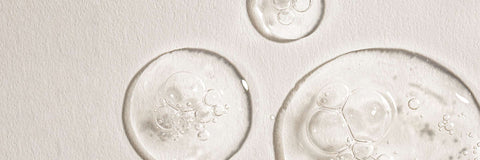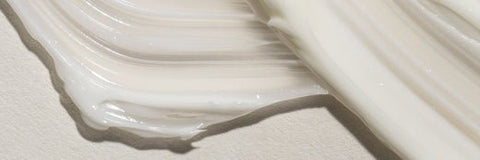Besides the obvious difference of texture and thickness, you might be wondering when to use a face oil over a face cream, and which is better for your skin. Moisturizers, or face creams, offer different benefits than face oils, but most skin types will benefit from one or the other, or both.
In this article, we’ll talk about face oil vs. moisturizer, benefits of both face oils and moisturizers, and whether you should use face oil before or after moisturizer.
IN A NUTSHELL
Main Takeaways: Generally speaking, moisturizers are water-based and hydrate the skin, while face oils restore and lock in moisture. However, a good moisturizer will include ingredients that will restore both water and oil to your skin, meaning it will both hydrate and moisturize.
Good to Know: There’s no reason you can’t use both a face oil and a moisturizer when needed.
Recommended Products: H2 Oh Yeah Hydrating Moisturizer, Youth Fairy Retinol Moisturizer, and Crème de la Cream Brightening Moisturizer.
Face Oil vs Moisturizer: What’s the Difference?
There are essentially three different ways your skin gets moisturized, either with a humectant, an emollient, or an occlusive.
Humectants, as you may remember, draw moisture from the deeper layers of the skin up to the top to hydrate the skin and keep it healthy looking. A good example of a humectant is hyaluronic acid.
Emollients add moisture to the skin topically. Cetearyl alcohol and panthenol are great examples of emollients.
Finally, occlusives form a barrier on the skin to protect it from losing water. A good example of a botanically-based occlusive is jojoba oil. Those with mature and very dry skin tend to love occlusives because they lose water so easily.
Generally speaking, a good face moisturizer will include all three, while oils have a tendency to be emollient and occlusive. This means that it will include ingredients that will both hydrate and moisturize your skin.
Benefits of Face Oil
Although most face oils act as occlusives, different face oils do different things for your skin, and thus have many different benefits. Unless you have some kind of allergy, there’s no reason you can’t use more than one kind of face oil to reap their different benefits. Let’s talk about the benefits of face oils:
Sunflower Oil
Not only do sunflowers look gorgeous, but the oil they produce is also fabulous for your skin. Acting as a protective barrier, it helps soften the skin and soothe it at the same time.
Rosehip Oil
In addition to hydrating the skin, rosehip oil is known for its ability to even out skin tone. It’s full of fatty acids that help get to work on fine lines and wrinkles; it also includes vitamin C which not only brightens skin, but is a great antioxidant.
Castor Oil
Castor oil is a wonderful humectant that not only moisturizes the face but smoothes it as well. Believe it or not, it can also be used as a makeup remover. Bonus benefit: It also helps give your hair a little extra shine.
Lavender Oil
Lavender oil is known particularly for its ability to improve the appearance of dark spots and uneven skin tone. In addition to its lovely scent, lavender oil also contains antioxidants that help protect the skin from environmental stressors.
Grapeseed Oil
In part because it’s packed with one of our favorite hydrators, vitamin E, grapeseed oil does a fabulous job of moisturizing the skin and helps keep pores clear.
Jojoba Oil
No list of face oils is complete without a mention of jojoba oil. Aside from being a great moisturizer, jojoba oil is wonderful for balancing skin’s natural oils and for alleviating redness.
Keep in mind that these face oils are frequently combined in a single product. For example, our H2 Oh Yeah hydrating moisturizer contains grapeseed oil to hydrate the skin, plus jojoba oil to alleviate redness and balance skin’s natural oils.
Benefits of Moisturizer
As we mentioned above, a good moisturizer will include ingredients in these three categories: humectants, emollients, and occlusives. The combination of these three together offer a multitude of benefits, including:
Moisturizers both hydrate and moisturize the skin
Again, hydrating means restoring water to your skin, and moisturizing means restoring oil to your skin. Most moisturizers do both (while a face oil only restores oil). Look for moisturizers that contain ingredients like vitamin E that help add moisture, or hyaluronic acid to lock hydration into your skin.
Moisturizers protect the skin
By sealing in hydration and moisture, as well as any other products you may have applied to your face prior, moisturizers can help protect the skin by restoring its natural protective barrier.
Moisturizers are anti-aging
Because of their ability to infuse skin with hydration, moisturizers are able to visibly reduce the appearance of fine lines and wrinkles that can occur from sun damage, lack of hydration, smoking, or even heredity. Retinol moisturizers, like Youth Fairy , are great for their anti-aging benefits.
Moisturizers help prepare skin for makeup
Combined with a good skincare routine that includes cleansing and exfoliating, a layer of moisturizer will help smooth your skin, allowing your makeup to apply evenly.
Moisturizer restores skin’s glow
A lack of hydration can make skin look dull. Restoring proper hydration to your skin brings back its glow; a good moisturizer will help plump and revive dull, flat looking skin. Look for a brightening moisturizer that includes vitamin C, such as Crème de la Cream, for restoring your skin’s radiance.
Moisturizer can help calm the skin
It depends what the issue is, but if you have skin that acts up or is easily irritated, a moisturizer can often help calm and soothe temporary redness and irritation.
Face Oil vs. Moisturizer - Which one should you use?
When deciding which option to use, consider your skin’s current needs. It can change during different seasons and in varying environments. If you have very dry skin, you will benefit from using both a face oil and a moisturizer. On the other hand, if your skin is naturally oil rich, using a face oil might feel too heavy to use during the day. If you prefer to use both, you can always add a drop or two of face oil to your moisturizer and massage it into your skin until absorbed.
We hope that this article helps clarify the difference between face oils and moisturizers, and that it helps you decide which one is right for you. Remember, it’s ok to use both; but if you are only using one, stick with a moisturizer that will both hydrate and moisturize your skin.







